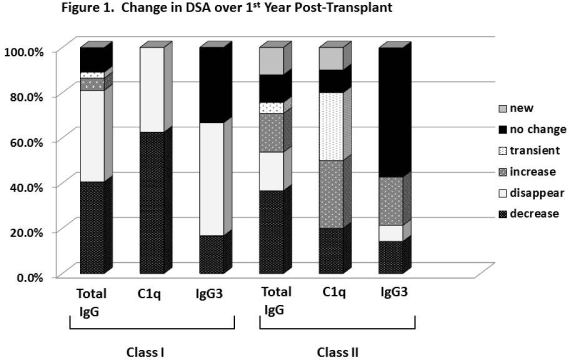Donor-Specific Alloantibody After Positive Crossmatch Kidney Transplantation With Eculizumab (EC): Correlation With Transplant Glomerulopathy and Graft Failure
1Mayo Clinic, Rochester, MN
2Paul Terasaki Foundation, Los Angeles, CA.
Meeting: 2015 American Transplant Congress
Abstract number: 31
Keywords: Antibodies, HLA antibodies, Kidney transplantation, Rejection
Session Information
Session Name: Concurrent Session: Kidney Antibody Mediated Rejection I
Session Type: Concurrent Session
Date: Sunday, May 3, 2015
Session Time: 2:15pm-3:45pm
 Presentation Time: 3:03pm-3:15pm
Presentation Time: 3:03pm-3:15pm
Location: Terrace I-III
Introduction. EC (C5 blockade) reduces the incidence of early clinical acute antibody mediated rejection (AMR) after +XMKTx, but does not prevent chronic AMR. We examined the change in DSA post-transplant and whether characteristics (ie. C1q binding, IgG3 subclass, and/or level of DSA) were associated with chronic AMR.
Methods: +XMKTx recipients (baseline B flow XM 200-450) received EC (N=30) at transplant and continued for 1 year or until the BFXM was <200. DSA characteristics (total IgG MFI, IgG3, and C1q) were measured serially baseline, post-transplant days 7,14,28,90, and 365 and then correlated with histology at 1 year and graft survival.
Results: Most class I DSA IgG specificities decreased by at least MFI 1000 [40.5%(15/37)] or completely disappeared [40.5%(15/37)] from baseline to 1 year. Only [5.4%(2/37)] increased and no new class I DSA were identified. The following trends were identified for class II DSA: 36.6%(15/41) decreased, 17.1%(7/41) disappeared, 17.1%(7/41) increased, and 12.2%(5/41) were new. These trends occurred despite the absence of plasmapheresis or bortezomib and when C1q and IgG3 subclass specificities were examined.  Persistent class I or class II DSA (MFI >1000) at 1 year was associated with Banff cg score >0 (TG) at 1 year, p<0.01. No patients (0/11) whose DSA decreased to MFI < 1000 developed TG by 1 year, while 33% (2/6) with persistent class I alone, 37.5% with persistent anti-class 2 alone, and 60% (3/5) with class I and class II developed TG by 1 year. Only baseline IgG3 was associated with graft failure. Fifty percent (3/6) of patients with IgG 3 of MFI >1000 at baseline developed graft failure within 5 years post-transplant as compared to 0% (0/10) if IgG 3 MFI<1000 (p=0.04).
Persistent class I or class II DSA (MFI >1000) at 1 year was associated with Banff cg score >0 (TG) at 1 year, p<0.01. No patients (0/11) whose DSA decreased to MFI < 1000 developed TG by 1 year, while 33% (2/6) with persistent class I alone, 37.5% with persistent anti-class 2 alone, and 60% (3/5) with class I and class II developed TG by 1 year. Only baseline IgG3 was associated with graft failure. Fifty percent (3/6) of patients with IgG 3 of MFI >1000 at baseline developed graft failure within 5 years post-transplant as compared to 0% (0/10) if IgG 3 MFI<1000 (p=0.04).
Conclusions: Anti-class I DSA often decreases or disappears after +XMKTx, even without antibody depleting therapy; but the trend in anti-class II DSA is variable. Persistent DSA is associated with the development of TG at 1 year. Only high IgG3 and not total IgG or C1q at baseline was associated with early graft failure.
To cite this abstract in AMA style:
Schinstock C, Cosio F, Cornell L, Gandhi M, Everly M, Stegall M. Donor-Specific Alloantibody After Positive Crossmatch Kidney Transplantation With Eculizumab (EC): Correlation With Transplant Glomerulopathy and Graft Failure [abstract]. Am J Transplant. 2015; 15 (suppl 3). https://atcmeetingabstracts.com/abstract/donor-specific-alloantibody-after-positive-crossmatch-kidney-transplantation-with-eculizumab-ec-correlation-with-transplant-glomerulopathy-and-graft-failure/. Accessed February 17, 2026.« Back to 2015 American Transplant Congress
